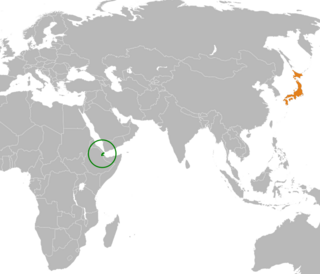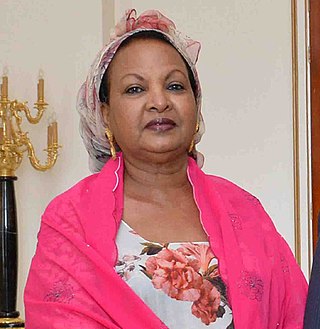
Politics of Djibouti takes place in a framework of a presidential representative democratic republic, whereby the executive power is exercised by the President and the Government. Legislative power is vested in both the Government and the National Assembly. The party system and legislature are dominated by the socialist People's Rally for Progress. In April 2010, a new constitutional amendment was approved. The President serves as both the head of state and head of government, and is directly elected for single six-year term. Government is headed by the President, who appoints the Prime Minister and the Council of Ministers on the proposal of the latter. There is also a 65-member chamber of deputies, where representatives are popularly elected for terms of five years. Administratively, the country is divided into five regions and one city, with eleven additional district subdivisions. Djibouti is also part of various international organisations, including the United Nations and Arab League.

Ismaïl Omar Guellé is a Djiboutian politician who has served as the President of Djibouti since 1999, making him one of the longest-serving rulers in Africa. He is often referred to by his initials, IOG.

The People's Rally for Progress is a political party in Djibouti. It has dominated politics in the country since 1979, initially under the rule of President Hassan Gouled Aptidon. Today it is led by President Ismaïl Omar Guelleh and is in a coalition government with Front for the Restoration of Unity and Democracy (FRUD) and other parties. The RPP tends to hold more influence among the Issa population.
The Movement for Democratic Renewal and Development, is a political party in Djibouti. It was originally known as the Party for Democratic Renewal. The PRD of Djibouti was created with the purpose of forming a national democratic party. The PRD gained popularity at the collapse of the communist bloc and the end of the Cold War. It used its military power gained through its coalition with the Front for the Restoration of Unity and Democracy (FRUD) and the Movement for Peace and Reconciliation (MPR). The current leader of PRD is Abdillani Hamariteha.

Hassan Gouled Aptidon was the first President of Djibouti from 1977 to 1999.

Ahmed Dini Ahmed was a Djiboutian politician who served as the second Prime Minister of Djibouti. He was trained as a health technician and entered the political realm at age 26.

National-level elections in Djibouti are held for the President and the unicameral National Assembly.
Mohamed Daoud Chehem is a senior civil servant, noted opposition leader and former presidential candidate for the Azuria Development Party (PDD) in Djibouti. Chehem is a member of the Afar ethnic group, and was part of the Afar rebel Front for the Restoration of Unity and Democracy (FRUD) opposition movement. In 1991, in a wave of mass arrests in the midst of a civil war between FRUD and Hassan Gouled Aptidon's oppressive regime, Chehem was imprisoned and tortured. Amnesty International, in a statement, said that prisoners like Chehem "may in fact be prisoners of conscience, imprisoned because of their opposition to the government rather than because there is any evidence that they participated in anti-government violence."^ In 1997 it was widely reported that Chehem along with five other FRUD members, was abducted from Ethiopia and given over to agents of Hassan Gouled Aptidon's regime. Chehem was again subjected to torture and the political prisoners' plight became the subject of campaigns by Amnesty International and other human rights groups.^ In addition, United Nations Special Rapporteur of the Commission on Human Rights, Nigel S. Rodley sent an urgent request for their release to Aptidon's government.^

The El Hadj Hassan Gouled Aptidon Stadium is a multi-use stadium in Djibouti City, Djibouti. It is currently reserved mostly for football matches. The stadium has a capacity of hosting up to 20,000 fans. As of April 2007, the Stade has an artificial turf pitch courtesy of FIFA's Win in Africa development programme. It is currently the home ground of the Djibouti national football team. The stadium is home to many sports federations in Djibouti, including the Djiboutian Football Federation.

Presidential elections were held in Djibouti on 8 April 2005. The incumbent President of Djibouti, Ismail Omar Guelleh, was re-elected to a second six-year term in an unopposed election.
Total F.C. is a football team from Djibouti City, Djibouti.

General elections were held in Djibouti on 24 April 1987 to elect a President and National Assembly. At the time, the country was a one-party state with the People's Rally for Progress (RPP) as the only legally permitted party. In the presidential election, incumbent president Hassan Gouled Aptidon was the only candidate for the presidency, and was re-elected unopposed. In the National Assembly elections, voters were presented with a single list of 65 RPP candidates. They could only vote against by casting a blank vote or abstaining. The list was approved by 87% of registered voters. Voter turnout for the National Assembly vote was slightly lower at 88.69%.

Presidential elections were held in Djibouti on 9 April 1999. Following the retirement of Hassan Gouled Aptidon, who had served as President since independence in 1977, his nephew Ismail Omar Guelleh won the nomination of the ruling People's Rally for Progress. His only opponent was Ahmed-Idriss Moussa who ran as an independent, with the support of the National Democratic Party-Democratic Renewal Party coalition. The result was victory for Guelleh, who won 74% of the vote.

Presidential elections were held in Djibouti on 7 May 1993. They followed the constitutional changes approved in a referendum the previous year, which re-introduced multi-party democracy, and were the first presidential elections to feature more than one candidate. Nevertheless, incumbent President Hassan Gouled Aptidon of the People's Rally for Progress won, taking 60.7% of the vote, based on a 51.25 turnout.
Ahmed-Idriss Moussa is a Djiboutian politician who served in the French National Assembly from 1962 to 1967. An independent, he was the main opposition candidate in the 1999 presidential election against President Ismaïl Omar Guelleh.

Djibouti–Japan relations are bilateral relations between Djibouti and Japan. Djibouti has maintained an embassy in Tokyo since 1989, whilst Japan has maintained an embassy in Djibouti City since 2009.

Territorial Council elections were held in French Somaliland on 23 June 1957. The Republican Union won all 30 seats.
The 2017 Arab Club Championship qualifying rounds were played from 14 September 2016 to 4 March 2017. A total of 11 teams from 11 associations from Africa and Asia competed in the qualifying rounds to decide which 3 teams would qualify for the group stage of the 2017 Arab Club Championship held in Egypt, alongside 9 automatically qualified teams.

The First Lady of Djibouti is the spouse of the president of Djibouti. The present first lady is Kadra Mahamoud Haid, wife of President Ismaïl Omar Guelleh. Guelleh assumed office on 8 May 1999.











